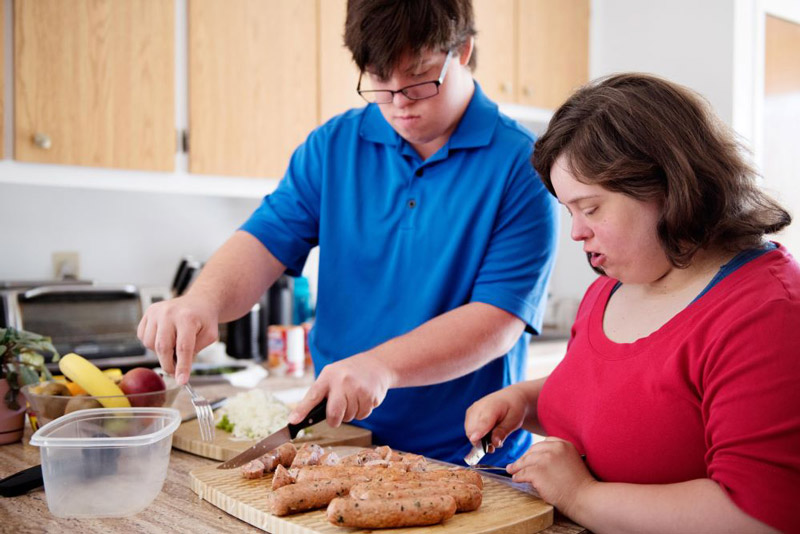Physical health and nutrition can be a challenge for many college students as they move away from their parents and onto campus. The transition often brings about additional weight gain – according to research from Auburn University in Alabama, 70% of college students gain weight and body fat by graduation. This weight gain is often fueled by a greater sense of freedom around dietary choices, easy access to unhealthy snacks in vending machines and campus shops, larger portions in cafeteria meals, and changes to regular eating schedules.
The risk of health issues can be even greater among students with disabilities, who face additional challenges in making healthy choices. “There are a ton of barriers,” says Samantha Bear, Adult Living Skills Professor and Campus and Community Life Coordinator at AbleLight College. “The unique struggles that each individual has with health and wellness can be exacerbated by being on campus, and we have seen students both gain and lose weight once they move to campus.”
Physical limitations can make maneuvering the cafeteria more difficult (such as accessing the salad bar), while rigid food preferences or aversions often lead to students eating a very limited diet. Struggles with communication can also lead to issues – one student at AbleLight College was eating pizza every day because it was self-serve and she preferred not to interact with cafeteria staff, while others struggle with reading cafeteria signs and deciphering nutritional facts.
On campus, no one is telling students when or what to eat, so it’s up to each student to know what’s best for them and to engage others in helping them stay on track. Here are some ways you can support your student as they make the transition:
Set clear expectations – and explain the “why“
According to Bear, parents usually have the strongest pull with their student and shouldn’t underestimate their impact. “Set strong expectations with your student about what’s expected of them at mealtime, but also explain why health is important, why they should be motivated to make good decisions and how it will help them long-term,” Bear stressed.
Encourage students to advocate for their needs
For some students, medical diagnoses drive behavioral change as they are forced to advocate for their needs. One AbleLight College student learned she was at risk of becoming diabetic and, having watched her father struggle with the disease, became motivated to get her own health in order. “She asked the cafeteria staff to only serve her healthy food and to make sure she was making the right choices,” Bear said. “Another student was diagnosed with celiac disease and learned to ask if menu items are gluten-free and what symbols to look for.” While a medical diagnosis could be a driving factor, reinforce the idea that the increased freedom of college means that they need to look out for themselves and make the right choices.
Enforce accountability
Many students see success from using food journals or having regular check-ins with parents or advisors about their meals. Food and fitness apps can help track calorie counts and activity levels, which make it easier to have conversations about progress and setbacks, but students with disabilities often need a push by having someone do this with them. At AbleLight College, resident advisors also strive to model healthy eating and behavior during meals, as the added visibility helps students make better choices and opens the door for conversations.
Help keep healthy snacks handy
Meal plans and campus dining options make it easy for students to make less-than-ideal decisions with a single card swipe. “Students often go to our on-campus store to get a snack and choose the most desirable – and often least healthy – option, like chips or ice cream,” said Bear. “Having healthy snacks available can help prevent these late-night runs.”

